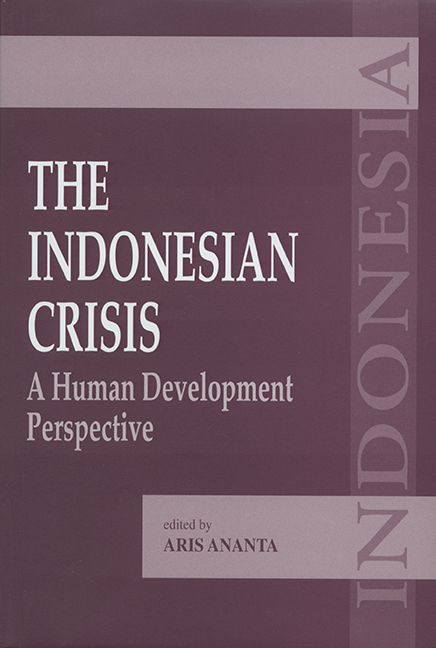Book contents
- Frontmatter
- Contents
- Acknowledgements
- List of Contributors
- Part I Introduction
- Part II Human Capital
- Part III Purchasing Power
- Part IV Emerging Issues
- 13 Political Economy of Business Relations between Indonesia and Singapore
- 14 Drug Abuse in Indonesia: An Increasing Problem During the Economic Crisis
- 15 Managing the Elderly in a Crisis Situation
- 16 The Indonesian Crisis in an Alternative Perspective: Views from Outer Indonesia
- Index
15 - Managing the Elderly in a Crisis Situation
from Part IV - Emerging Issues
Published online by Cambridge University Press: 21 October 2015
- Frontmatter
- Contents
- Acknowledgements
- List of Contributors
- Part I Introduction
- Part II Human Capital
- Part III Purchasing Power
- Part IV Emerging Issues
- 13 Political Economy of Business Relations between Indonesia and Singapore
- 14 Drug Abuse in Indonesia: An Increasing Problem During the Economic Crisis
- 15 Managing the Elderly in a Crisis Situation
- 16 The Indonesian Crisis in an Alternative Perspective: Views from Outer Indonesia
- Index
Summary
How old are you?
Age is quality of mind
If you have left your dream behind
If hope is cold
If you no longer look ahead
If your ambition's fires are dead
Then you are old
But if from life you take the best
If in life you keep the jest
If love you hold
No matter how the years go by
No matter how the birthdays fly
You are not old
— H. S. Fritsch (Warta Demografi, no. 1, th. 24, 1994)Introduction
In many societies, the old people form a vulnerable and financially weak group in the population. They are vulnerable because of their poor health and physical condition, disabilities, social isolation, poor housing, and lack of care. They are financially weak because they do not have enough savings or their pension is too little to support their lives at old age. Many of them have to depend on their children or relatives or are forced to continue working to make ends meet. The economic crisis has presumably worsened the condition of the elderly although the impact differs because senior citizens are not a homogenous group.
The number of elderly persons will increase rapidly in the coming half century. The trend of population ageing is confirmed since future senior citizens are already there and their survival can be forecasted with accuracy, barring unforeseen calamities. The impact of two decades of fertility and mortality decline is shown in the rapid growth rates of the older age groups and the low growth rates of children. In Indonesia, the population aged 65 years and older more than doubled between 1971 and 1990, from 2.97 million to 6.75 million, or from 2.5 to 3.8 per cent of the population (Hugo 1996, p. 15). By the year 2025, some 13 per cent of the population will be 60 years or older, a rise from about 7.6 per cent in 2000. Ageing is a global event and will spare no country. The United Nations considers ageing as one of the urgent issues in the coming decades (UN 1992b, 1993; and UNFPA, 1998).
- Type
- Chapter
- Information
- The Indonesian CrisisA Human Development Perspective, pp. 382 - 416Publisher: ISEAS–Yusof Ishak InstitutePrint publication year: 2002

